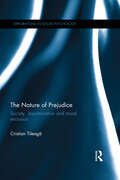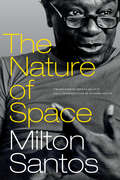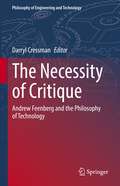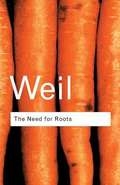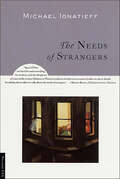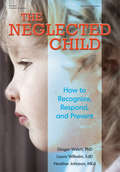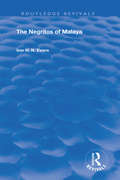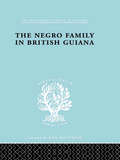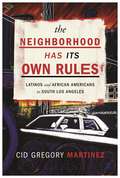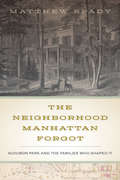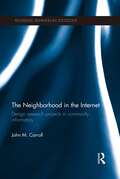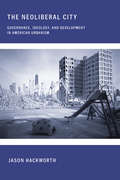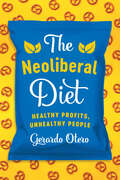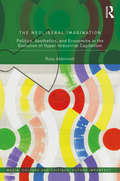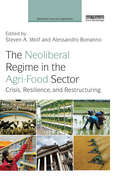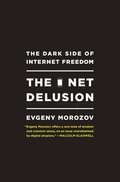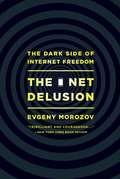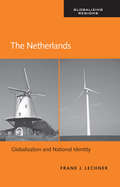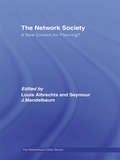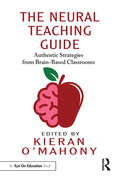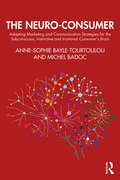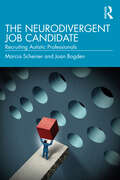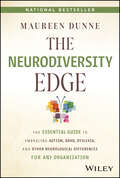- Table View
- List View
The Nature of Prejudice: Society, discrimination and moral exclusion (Explorations in Social Psychology)
by Cristian TileagăThis book offers a critical synthesis of social psychology’s contribution to the study of contemporary racism, and proposes a critical reframing of our understanding of prejudice in European society today. Chapters place a special emphasis on the diversity and intensity of prejudices against Romani people in a liberal, progressive, decent, enlarged Europe. Chapters ask how we can reconcile the European creed of law, justice and freedom for all, with social and political practices that exclude and degrade Romani people. <P><P> This volume addresses the need for a deeper recognition of societal foundations of ideologies of moral exclusion, and calls for a closer and more thorough investigation of prejudices that stem from the societal transformation, diminution or denial of moral worth of human beings (and the various conditions and contexts that create and promote it). By opening new intellectual dialogues, the book reinvigorates a renewed social psychology of racism, and creates a broader foundation for the exploration of the various, active paradoxes at the heart of the social expression of prejudice in liberal democracies. <P><P> The Nature of Prejudice is essential reading for academics, researchers and postgraduate students interested in both the quantitative and qualitative study of discrimination, inequality and social exclusion.
The Nature of Space (Latin America in Translation)
by Milton SantosIn The Nature of Space, pioneering Afro-Brazilian geographer Milton Santos attends to globalization writ large and how local and global orders intersect in the construction of space. Santos offers a theory of human space based on relationships between time and ontology. He argues that when geographers consider the inseparability of time and space, they can then transcend fragmented realities and partial truths without trying to theorize their way around them. Based on these premises, Santos examines the role of space, which he defines as indissoluble systems of objects and systems of actions in social processes, while providing a geographic contribution to the production of a critical social theory.
The Nature of Supreme Court Power
by Matthew E. K. HallFew institutions in the world are credited with initiating and confounding political change on the scale of the United States Supreme Court. The Court is uniquely positioned to enhance or inhibit political reform, enshrine or dismantle social inequalities, and expand or suppress individual rights. Yet despite claims of victory from judicial activists and complaints of undemocratic lawmaking from the Court's critics, numerous studies of the Court assert that it wields little real power. This book examines the nature of Supreme Court power by identifying conditions under which the Court is successful at altering the behavior of state and private actors. Employing a series of longitudinal studies that use quantitative measures of behavior outcomes across a wide range of issue areas, it develops and supports a new theory of Supreme Court power. Matthew E. K. Hall finds that the Court tends to exercise power successfully when lower courts can directly implement its rulings; however, when the Court must rely on non-court actors to implement its decisions, its success depends on the popularity of those decisions. Overall, this theory depicts the Court as a powerful institution, capable of exerting significant influence over social change.
The Necessity of Critique: Andrew Feenberg and the Philosophy of Technology (Philosophy of Engineering and Technology #41)
by Darryl CressmanThe essays in this edited collection are inspired by Andrew Feenberg’s philosophy of technology. Feenberg is the leading critical theorist of technology working today, combining the critical traditions of Karl Marx, Martin Heidegger, Georg Lukáacs, and Herbert Marcuse with empirical methods from science & technology studies (STS) and media studies.Divided into three parts, these contributions from philosophers, media theorists, design theorists, and STS scholars, reflect the relevancy of Feenberg's philosophy for making sense of our technically mediated society. This collection appeals to students and researchers interested in the philosophy of technology, critical theory, smart cities, big data, AI, and algorithmic culture.
The Need for Roots: Prelude to a Declaration of Duties towards Mankind
by Simone Weil Arthur WillisHailed by Andre Gide as the patron saint of all outsiders, Simone Weil's short life was ample testimony to her beliefs. In 1942 she fled France along with her family, going firstly to America. She then moved back to London in order to work with de Gaulle. Published posthumously The Need for Rootswas a direct result of this collaboration. Its purpose was to help rebuild France after the war. In this, her most famous book, Weil reflects on the importance of religious and political social structures in the life of the individual. She wrote that one of the basic obligations we have as human beings is to not let another suffer from hunger. Equally as important, however, is our duty towards our community: we may have declared various human rights, but we have overlooked the obligations and this has left us self-righteous and rootless. She could easily have been issuing a direct warning to us today, the citizens of Century 21.
The Needs of Strangers
by Michael IgnatieffThis thought provoking book uncovers a crisis in the political imagination, a wide-spread failure to provide the passionate sense of community "in which our need for belonging can be met." Seeking the answers to fundamental questions, Michael Ignatieff writes vividly both about ideas and about the people who tried to live by them-from Augustine to Bosch, from Rousseau to Simone Weil. Incisive and moving, The Needs of Strangers returns philosophy to its proper place, as a guide to the art of being human.
The Neglected Child: How to Recognize, Respond, and Prevent
by Ginger Welch Laura Wilhelm Heather JohnsonThe Neglected Child provides everything educators and caregivers need to know to identify and intervene in neglectful situations, while also creating a safe, nurturing, and protective environment for young children. From defining the different types and levels of severity of neglect to establishing suspicion and reporting neglectful situations, this book is filled with helpful information from expert psychologists and educators in the field today. Each chapter includes a brief quiz to assess chapter learning and "Notes from the Field" that represent real-life stories the authors have encountered in their work. The appendices at the end of the text include reproducible handouts, sample statements for parent handbooks, self-assessments for teachers, and important contact information to use when reporting neglect.
The Negritos of Malaya (Routledge Revivals)
by Ivor H. EvansPublished in 1937. This book, written by the well-known authority on the ethnology and archaeology of the Malay Peninsula, presents a compact and detailed account of the Negritos, one of the three paga races of the Peninsula. It brings up to date much of the previous work on this subject, and deals with all aspects of their character and environment. By way of introduction, there is a general description of the geography and development of the Peninsula, together with a discussion of statistics concerning the tribe's distribution, their health, habitat, and territories. The author then examines the various aspects of their everyday life, including social and domestic customs, hunting, agriculture, dress, ornamentation, musical instruments, and art, as well as their religious beliefs and superstitions. The chapters on their weapons are particularly detailed and informative, and the book is supported throughout by useful illustrations. Although many further studies of this area and its people have been made since the first publication of this book in 1937, its methodical and careful documentation has yet to be superseded, and it remains indispensable to all students of anthropology and sociology.
The Negro Family in British Guiana: Family Structure and Social Status in the Villages (International Library of Sociology #Vol. 66)
by Raymond T. SmithThis is Volume IX of eighteen in a collection on the Sociology of Development. Originally published in 1956 and using language of the time, this monologue looks at the family system in Guianese families.
The Neighborhood Has Its Own Rules: Latinos and African Americans in South Los Angeles
by Cid MartinezSouth Los Angeles is often seen as ground zero for inter-racial conflict and violence in the United States. Since the 1940s, South LA has been predominantly a low-income African American neighborhood, and yet since the early 1990s Latino immigrants—mostly from Mexico and many undocumented—have moved in record numbers to the area. Given that more than a quarter million people live in South LA and that poverty rates exceed 30 percent, inter-racial conflict and violence surprises no one. The real question is: why hasn't there been more? Through vivid stories and interviews, The Neighborhood Has Its Own Rules provides an answer to this question. Based on in-depth ethnographic field work collected when the author, Cid Martinez, lived and worked in schools in South Central, this study reveals the day-to-day ways in which vibrant social institutions in South LA— its churches, its local politicians, and even its gangs—have reduced conflict and kept violence to a level that is manageable for its residents. Martinez argues that inter-racial conflict has not been managed through any coalition between different groups, but rather that these institutions have allowed established African Americans and newcomer Latinos to co-exist through avoidance—an under-appreciated strategy for managing conflict that plays a crucial role in America's low-income communities. Ultimately, this book proposes a different understanding of how neighborhood institutions are able to mitigate conflict and violence through several community dimensions of informal social controls.
The Neighborhood Manhattan Forgot: Audubon Park and the Families Who Shaped It
by Matthew SpadyAudubon Park’s journey from farmland to cityscapeThe study of Audubon Park’s origins, maturation, and disappearance is at root the study of a rural society evolving into an urban community, an examination of the relationship between people and the land they inhabit. When John James Audubon bought fourteen acres of northern Manhattan farmland in 1841, he set in motion a chain of events that moved forward inexorably to the streetscape that emerged seven decades later. The story of how that happened makes up the pages of The Neighborhood Manhattan Forgot: Audubon Park and the Families Who Shaped It.With a colorful cast of characters drawn from the upper crust of nineteenth-century New York City, this fully illustrated history peels back the many layers of a rural society evolving into an urban community, enlivened by the people who propelled it forward: property owners, tenants, laborers, and servants. Thoroughly researched through primary and secondary sources, as well as private collections, The Neighborhood Manhattan Forgot tells the intricate tale of how individual choices in the face of family dysfunction, economic crises, technological developments, and the myriad daily occurrences that elicit personal reflection and change of course pushed Audubon Park forward to the cityscape that distinguishes the neighborhood today. A longtime evangelist for Manhattan’s Audubon Park neighborhood, author Matthew Spady delves deep into the lives of the two families most responsible over time for the anomalous arrangement of today’s streetscape: the Audubons and the Grinnells. Buoyed by his extensive research, Spady reveals the darker truth behind John James Audubon (1785–1851), a towering patriarch who consumed the lives of his family members in pursuit of his own goals. He then narrates how fifty years after Audubon’s death, George Bird Grinnell (1849–1938) and his siblings found themselves the owners of extensive property that was not yielding sufficient income to pay taxes, insurance, and maintenance. Like the Audubons, they planned an exit strategy for controlled change that would have an unexpected ending. Beginning with the Audubons’ return to America in 1839, The Neighborhood Manhattan Forgot follows the many twists and turns of the area’s path from forest to city, ending in the twenty-first century with the Audubon name repurposed in today’s historic district, a multi-ethnic, multi-racial urban neighborhood far removed from the homogeneous, Eurocentric Audubon Park suburb.
The Neighborhood in the Internet: Design Research Projects in Community Informatics (Routledge Advances in Sociology)
by John M. CarrollToday, "community" seems to be everywhere. At home, at work, and online, the vague but comforting idea of the community pervades every area of life. But have we lost the ability truly to understand what it means? The Neighborhood in the Internet investigates social and civic effects of community networks on local community, and how community network designs are appropriated and extended by community members. Carroll uses his conceptual model of "community" to re-examine the Blacksburg Electronic Village – the first Web-based community network – applying it to attempts to sustain and enrich contemporary communities through information technology. The book provides an analysis of the role of community in contemporary paradigms for work and other activity mediated by the Internet. It brings to the fore a series of design experiments investigating new approaches to community networking and addresses the future trajectory and importance of community networks. This book will be of interest to students of sociology, community psychology, human-computer interaction, information science, and computer-supported collaborative work.
The Neoliberal City: Governance, Ideology, and Development in American Urbanism
by Jason HackworthThe shift in the ideological winds toward a "free-market" economy has brought profound effects in urban areas. The Neoliberal City presents an overview of the effect of these changes on today's cities. The term "neoliberalism" was originally used in reference to a set of practices that first-world institutions like the IMF and World Bank impose on third-world countries and cities. The support of unimpeded trade and individual freedoms and the discouragement of state regulation and social spending are the putative centerpieces of this vision. More and more, though, people have come to recognize that first-world cities are undergoing the same processes.In The Neoliberal City, Jason Hackworth argues that neoliberal policies are in fact having a profound effect on the nature and direction of urbanization in the United States and other wealthy countries, and that much can be learned from studying its effect. He explores the impact that neoliberalism has had on three aspects of urbanization in the United States: governance, urban form, and social movements. The American inner city is seen as a crucial battle zone for the wider neoliberal transition primarily because it embodies neoliberalism's antithesis, Keynesian egalitarian liberalism.Focusing on issues such as gentrification in New York City; public-housing policy in New York, Chicago, and Seattle; downtown redevelopment in Phoenix; and urban-landscape change in New Brunswick, N.J., Hackworth shows us how material and symbolic changes to institutions, neighborhoods, and entire urban regions can be traced in part to the rise of neoliberalism.
The Neoliberal Diet: Healthy Profits, Unhealthy People
by Gerardo OteroThis “remarkable, comprehensive” study of neoliberal agribusiness and the obesity epidemic “is critical reading for food studies scholars” (Contemporary Sociology).Obesity rates are rising across the United States and beyond. While some claim that people simply eat too much “energy-dense” food while exercising too little, The Neoliberal Diet argues that the issue is larger than individual lifestyle choices. Since the 1980s, the shift toward neoliberal regulation has enabled agribusiness multinationals to thrive by selling a combination of meat and highly processed foods loaded with refined flour and sugars—a diet that originated in the United States. Drawing on extensive empirical data, Gerardo Otero identifies the socioeconomic and political forces that created this diet, which has been exported around the globe at the expense of people’s health.Otero shows how state-level actions, particularly subsidies for big farms and agribusiness, have ensured the dominance of processed foods and made fresh foods inaccessible to many. Comparing agrifood performance across several nations, including the NAFTA region, and correlating food access to class inequality, he convincingly demonstrates the structural character of food production and the effect of inequality on individual food choices. Resolving the global obesity crisis, Otero concludes, lies not in blaming individuals but in creating state-level programs to reduce inequality and make healthier food accessible to all.
The Neoliberal Diet: Healthy Profits, Unhealthy People
by Gerardo OteroThis “remarkable, comprehensive” study of neoliberal agribusiness and the obesity epidemic “is critical reading for food studies scholars” (Contemporary Sociology).Obesity rates are rising across the United States and beyond. While some claim that people simply eat too much “energy-dense” food while exercising too little, The Neoliberal Diet argues that the issue is larger than individual lifestyle choices. Since the 1980s, the shift toward neoliberal regulation has enabled agribusiness multinationals to thrive by selling a combination of meat and highly processed foods loaded with refined flour and sugars—a diet that originated in the United States. Drawing on extensive empirical data, Gerardo Otero identifies the socioeconomic and political forces that created this diet, which has been exported around the globe at the expense of people’s health.Otero shows how state-level actions, particularly subsidies for big farms and agribusiness, have ensured the dominance of processed foods and made fresh foods inaccessible to many. Comparing agrifood performance across several nations, including the NAFTA region, and correlating food access to class inequality, he convincingly demonstrates the structural character of food production and the effect of inequality on individual food choices. Resolving the global obesity crisis, Otero concludes, lies not in blaming individuals but in creating state-level programs to reduce inequality and make healthier food accessible to all.
The Neoliberal Imagination: Politics, Aesthetics, and Economics in the Evolution of Hyper-Industrial Capitalism (Media, Culture and Critique: Future Imperfect)
by Ross AbbinnettThis book presents a polemical account of the historical development of the neoliberal imagination. Inspired by the thought of Frederic Jameson, Bernard Stiegler, and Timothy Morton, it argues that the evolution of virtual and information technologies has transformed the ideological imaginary of capitalism. Owing to the inseparability of the process of commodification from developments in the sphere of media technology – particularly the rise of the digital networks through which information is processed and disseminated – the aesthetic forms of the neoliberal imaginary are not external to the accelerated productivity and adaptability of human beings. Rather, they are essential both to the vision of progress that informs the technoscientific organization of capitalist society and to the practical formation of ‘the self’ that takes place within its networks. A snapshot of the evolving ‘world picture’ that is formed in the neoliberal imagination as articulated in its particular regime of capitalization, The Neoliberal Imagination will appeal to scholars of social theory and social philosophy with interests in neoliberalism.
The Neoliberal Regime in the Agri-Food Sector: Crisis, Resilience, and Restructuring (Earthscan Food and Agriculture)
by Alessandro Bonanno Steven A. WolfFor the last three decades, the Neoliberal regime, emphasising economic growth through deregulation, market integration, expansion of the private sector, and contraction of the welfare state has shaped production and consumption processes in agriculture and food. These institutional arrangements emerged from and advanced academic and popular beliefs about the virtues of private, market-based coordination relative to public, state-based problem solving. This book presents an informed, constructive dialogue around the thesis that the Neoliberal mode of governance has reached some institutional and material limits. Is Neoliberalism exhausted? How should we understand crisis applied to Neoliberalism? What are the opportunities and risks linked to the construction of alternatives? The book advances a critical evaluation of the evidence supporting claims of rupture of, or incursions into, the Neoliberal model. It also analyzes pragmatic responses to these critiques including policy initiatives, social mobilization and experimentation at various scales and points of entry. The book surveys and synthesizes a range of sociological frames designed to grapple with the concepts of regimes, systemic crisis and transitions. Contributions include historical analysis, comparative analysis and case studies of food and agriculture from around the globe. These highlight particular aspects of crisis and responses, including the potential for continued resilience, a neo-productivist return, as well as the emergence and scaling up of alternative models.
The Net Delusion
by Evgeny Morozov"The revolution will be Twittered!" declared journalist Andrew Sullivan after protests erupted in Iran in June 2009. Yet for all the talk about the democratizing power of the Internet, regimes in Iran and China are as stable and repressive as ever. In fact, authoritarian governments are effectively using the Internet to suppress free speech, hone their surveillance techniques, disseminate cutting-edge propaganda, and pacify their populations with digital entertainment. Could the recent Western obsession with promoting democracy by digital means backfire? In this spirited book, journalist and social commentator Evgeny Morozov shows that by falling for the supposedly democratizing nature of the Internet, Western do-gooders may have missed how it also entrenches dictators, threatens dissidents, and makes it harder--not easier--to promote democracy. Buzzwords like "21st-century statecraft" sound good in PowerPoint presentations, but the reality is that "digital diplomacy" requires just as much oversight and consideration as any other kind of diplomacy. Marshaling compelling evidence, Morozov shows why we must stop thinking of the Internet and social media as inherently liberating and why ambitious and seemingly noble initiatives like the promotion of "Internet freedom" might have disastrous implications for the future of democracy as a whole.
The Net Delusion: The Dark Side of Internet Freedom
by Evgeny MorozovEvgeny Morozov offers a rare note of wisdom and common sense, on an issue overwhelmed by digital utopians.
The Netherlands: Globalization and National Identity (Global Realities)
by Frank J. LechnerThe Netherlands is the first concise, authored introduction available on the topic. The Netherlands has been a key entrepot in the world capitalist system for centuries, but because of relatively recent demographic changes, it has become symbolic of the clash of European and Islamic cultures. Perhaps the most secular nation in the world, it now houses a very large Islamic population. That population is the fruit of globalization, and how the Dutch have responded to this broad cultural shift tells us a great deal about the changing nature of national identity in the age of globalization. In particular, Frank Lechner explains how globalization calls forth very particularistic and localist responses. Along with providing a broad overview of the contemporary Netherlands, Lechner will focus on how globalization is generating new discourses, cultures, and state policies. Among other topics, the book will feature chapters on soccer culture, religion (and the lack thereof), the media, the welfare state, multiculturalism, and the Netherlands place in the larger European Union.
The Network Society: A New Context for Planning (Networked Cities Series)
by Seymour J. Mandelbaum Louis AlbrechtsIn a clear and rewarding style, Albrechts and Mandelbaum consider the challenges that the new paradigm of the Network Society creates for Urban and Regional Planning. Chapters grouped into five themes discuss theoretical and practical perspectives on the contemporary organization of social, economic, cultural, political and physical spaces. These sections are: models of the Network Society the impact of physical networks such as transport challenges for Planners raised by society’s increased reliance on new technology an examination of local networks including community networks and the possibilities of setting up local networks for disaster recovery a comparison of spatial and policy networks and an exploration of the institutions involved. This book is essential reading for graduate level courses in urban studies, city and regional planning, and urban design. With its clear structure – unitary sections but a diversity of perspectives – the book can be used easily in courses such as Planning Theory, Urban Infrastructure and Public Policy.
The Neural Teaching Guide: Authentic Strategies from Brain-Based Classrooms
by Kieran O’MahonyThe Neural Teaching Guide showcases the innovative practices of K-12 teachers who are effectively applying findings from educational neuroscience into their classrooms. Educators today have remarkable opportunities to understand how the complex and often malleable functions of the brain affect learning, behavior, and social-emotional dynamics, but what practical strategies come out of this information? Authored by in-service teachers around the country, this book showcases a variety of brain-based approaches – cutting-edge yet intuitive, evidence-based yet accessibly translated – to helping children realize their potential at school. Both novice and veteran K-12 teachers alike will be reinvigorated to enhance students’ engagement and curiosity, nurture positive behaviors and self-regulation, support interest-based activities and inclusive interactions, identify biases and struggles, and more.
The Neuro-Consumer: Adapting Marketing and Communication Strategies for the Subconscious, Instinctive and Irrational Consumer's Brain
by Michel Badoc Anne-Sophie Bayle-TourtoulouNeuroscientific research shows that the great majority of purchase decisions are irrational and driven by subconscious mechanisms in our brains. This is hugely disruptive to the rational, logical arguments of traditional communication and marketing practices and we are just starting to understand how organizations must adapt their strategies. This book explains the subconscious behavior of the "neuro-consumer" and shows how major international companies are using these findings to cast light on their own consumers’ behavior. Written in plain English for business and management readers with no scientific background, it focuses on: how to adapt marketing and communication to the subconscious and irrational behaviors of consumers; the direct influence of the primary senses (sight, hearing, smell, taste, touch) on purchasing decisions and the perception of communications by customers’ brains; implications for innovation, packaging, price, retail environments and advertising; the use of "nudges" and artifices to increase marketing and communication efficiency by making them neuro-compatible with the brain’s subconscious expectations; the influence of social media and communities on consumers’ decisions – when collective conscience is gradually replacing individual conscience and recommendation becomes more important than communication; and the ethical limits and considerations that organizations must heed when following these principles. Authored by two globally recognized leaders in business and neuroscience, this book is an essential companion to marketers and brand strategists interested in neuroscience and vital reading for any advanced student or researcher in this area.
The Neurodivergent Job Candidate: Recruiting Autistic Professionals
by Joan Bogden Marcia ScheinerThis book provides guidance on recruiting, interviewing, and onboarding practices that will allow employers to successfully hire neurodivergent professionals into inclusive, competitive employment. Today, 35% of 18-year-olds with an autism spectrum diagnosis attend college, yet they have a 75–85% under-employment and unemployment rate after graduation. While organizations are looking to expand their diversity and inclusion hiring efforts to include neurodivergent professionals, current recruiting and interviewing practices in general are not well-suited to this. With over one-third of the US population identifying as neurodivergent, employers need to address how to attract this talent pool to take advantage of a meaningful segment of the workforce. Readers of this book will gain an understanding of how to guide their organizations through the creation of recruiting, interviewing, and onboarding processes tailored to neurodivergent professionals in any field. Written by authors with extensive experience working in the corporate world and consulting with Fortune 1000 companies on autism hiring efforts, this book is targeted at employers, acknowledging their perspective. Structured as a reference guide for busy recruiters, hiring managers, and supervisors, this book can be read in its entirety, in relevant sections as needed, or used as a refresher whenever necessary. This book also provides a background on the thinking styles of autistic individuals, giving the reader a deeper understanding of how to best support neurodivergent jobseekers.
The Neurodiversity Edge: The Essential Guide to Embracing Autism, ADHD, Dyslexia, and Other Neurological Differences for Any Organization
by Maureen DunneIn The Neurodiversity Edge, renowned Oxford-trained cognitive scientist, neurodiversity expert, and business leader, Dr. Maureen Dunne presents a pioneering framework to harnessing the power of neurodiversity to navigate the most important human resources revolution in the modern era. Did you know that an estimated 1 in 5 people are “neurodivergent”—have a mind that works differently, such as the autistic, ADHDers, the dyslexic, synesthetes, and other unique neurotypes—and that the vast majority are motivated, capable, and unemployed? This indispensable guide is based on more than two decades of immersive cognitive science research, case studies, stories from neurodivergent voices, in-the-trenches work with hundreds of organizations from start-ups to global Fortune 500 titans, and Dr. Dunne's own lived experiences as a neurodivergent employer, entrepreneur, board member, and CEO. Too many unique minds and perspectives on the sidelines, and too many organizations beset by groupthink, innovation-stagnation, and a lack of access to qualified new candidates. The Neurodiversity Edge takes you all the way from why to what and to how, delivering practical insights that build on a new foundational framework: Cultivate a values-driven approach to building a culture of sustained authentic inclusion where everyone can thrive, How to improve the interview process to avoid missing game-changing talent Develop a hybrid office protocol that works for everyone and a support infrastructure that aligns with universal design principles Discover why Google's Project Aristotle found that innovation and performance hinge on psychological safety Uncover and eliminate the destructive influence of unconscious cognitive biases Take a graphic tour into the wonders of the human mind Understand unique problem-solving abilities such as lateral thinking, visual-spatial thinking, multisensory thinking, leaps of creative insight, hyperfocus, and many more How to articulate and implement organizational goals and measure progress toward them The Neurodiversity Edge is an essential guide for executives, board directors, human resources professionals, managers, recruiters, entrepreneurs, venture capitalists, allies, educators, nonprofit leaders, and anyone with an interest in better understanding neurodiversity, authentic neuroinclusion, and the human mind.
